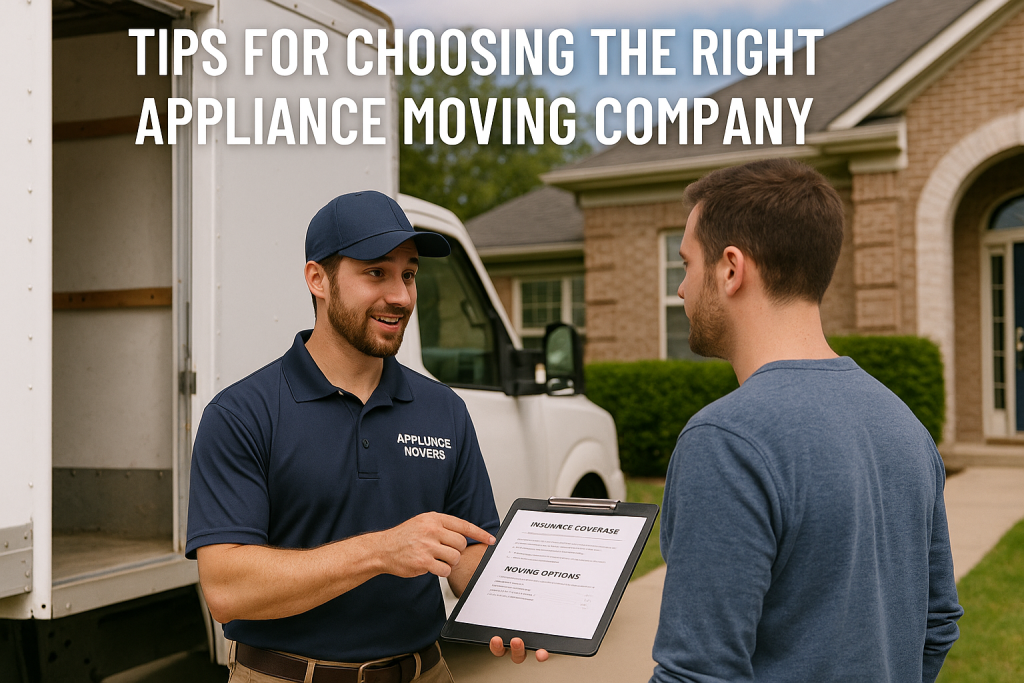When planning a move, it’s easy to overlook the challenge of relocating heavy appliances. From refrigerators to washing machines, these large items are essential to your everyday life but can be challenging to move without the right expertise. Professional appliance movers provide the experience and tools to make sure your appliances are transported safely and efficiently. In this article, we’ll explore why hiring professionals for your appliance move is a wise decision.
The Importance of Professional Appliance Movers
Moving large appliances can be more complicated than it seems. These items are often bulky, heavy, and fragile, and they require careful handling to prevent damage. Professional appliance movers are experts in safely relocating heavy equipment, minimizing the risk of injury or property damage. Whether you’re moving across town or across the country, professionals have the necessary skills and equipment to make the process easier.
Key Benefits of Hiring Appliance Movers
Here are some compelling reasons to hire appliance movers:
- Safety: Moving heavy appliances can result in serious injuries if not done correctly. Professional movers use proper lifting techniques and tools to prevent harm.
- Specialized Equipment: Appliance movers come equipped with dollies, ramps, straps, and other tools that make moving large and heavy appliances easier and safer.
- Time Efficiency: Moving heavy items can be time-consuming. Professionals are efficient, which means your move will be completed faster, allowing you to focus on other aspects of the relocation.
- Damage Prevention: Professional movers ensure that your appliances are packed securely and moved with care, thereby reducing the likelihood of scratches, dents, or other types of damage.
- Insurance: Many appliance moving companies offer insurance coverage for your appliances during transit. This adds an extra layer of protection and peace of mind.
Types of Appliances Moved by Professionals

Appliance movers are trained to handle a wide variety of appliances. Some everyday items they move include:
- Heavy Household Appliances: Refrigerators, stoves, washing machines, dryers, and dishwashers.
- Small Kitchen Appliances: Microwaves, ovens, and coffee machines that require careful handling to avoid damage.
- Commercial Appliances: Industrial kitchen equipment like restaurant refrigerators, ovens, and dishwashers, which require specialized moving services.
How to Choose the Right Appliance Movers
Choosing the right appliance movers for your move is crucial to ensuring a smooth experience. Consider the following when selecting a moving company:
- Experience: Choose a moving company with experience specifically in appliance relocation. They will have the expertise and equipment necessary to handle your items safely.
- Reputation: Look for movers with good reviews and references. Positive feedback from past customers is a strong indicator that the company provides reliable service.
- Insurance Coverage: Ensure that the moving company offers insurance to protect your appliances from damage during the move.
- Price: Compare prices from different movers to ensure you’re getting a fair deal. While cost is essential, it should not be the only factor in your decision.
Key Questions to Ask Appliance Movers
- Do you have experience with moving heavy appliances like refrigerators or washing machines?
- Are your movers insured, and what type of insurance do you offer?
- What kind of equipment do you use to ensure a safe move?
- Can you handle both residential and commercial appliance moves?
How Professional Appliance Movers Make Your Move Easier
Hiring professionals to handle your appliance move is more than just a convenience—it’s an investment in your peace of mind. Here’s how appliance movers make your relocation easier:
- Lifting and Handling: Appliance movers are trained to lift and maneuver heavy items safely, which reduces the risk of injury or damage to your appliances and property.
- Packing and Transporting: Movers know how to secure your appliances for transit, using padding and straps to prevent them from shifting or getting damaged in transit.
- Expert Navigation: Whether it’s navigating tight spaces, stairs, or narrow hallways, professional movers have the experience to get appliances to their new location without causing damage to your home or the appliances.
- Quick Setup: Once at your new location, appliance movers can quickly and efficiently install your appliances, ensuring that they’re ready for use right away.
Tips for a Smooth Appliance Move
To make sure your appliance move goes smoothly, follow these tips:
- Disconnect Appliances Beforehand: Unplug and disconnect appliances like refrigerators, stoves, and washers before the movers arrive. This will save time and prevent accidents.
- Measure Doorways and Spaces: Ensure that your appliances will fit through doorways, stairways, and hallways. This can help avoid last-minute issues.
- Clean and Defrost: Clean your appliances, especially refrigerators and freezers, and make sure they are defrosted to prevent water damage.
Frequently Asked Questions
1. How much do appliance movers charge?
The cost of appliance movers depends on several factors, such as the number of appliances, the distance, and the complexity of the move. It’s best to get quotes from multiple companies.
2. Do I need to disconnect my appliances before the move?
Yes, it’s important to disconnect all appliances, especially refrigerators and dishwashers, to avoid water leaks and to make the move faster.
3. Can appliance movers handle small appliances?
Yes, appliance movers can handle small kitchen appliances, such as microwaves, ovens, and dishwashers.
4. Are appliance movers insured?
Most appliance moving companies offer insurance coverage, but it’s essential to confirm the details before hiring a mover.
5. How early should I book appliance movers?
It’s recommended to book movers at least a couple of weeks in advance, especially during peak moving seasons.

Hiring professional appliance movers is a wise choice for anyone looking to relocate large or heavy appliances. With their experience, specialized tools, and safety precautions, professional movers make the process quick, efficient, and hassle-free. Whether you’re moving a refrigerator, washing machine, or commercial kitchen equipment, hiring the right experts ensures your appliances are moved safely and securely. By following the tips outlined in this guide and asking the right questions, you’ll make sure your move is as smooth as possible.
Buzzmoving makes your move easy by linking you with trusted movers nationwide. Get a free quote today and let our experts manage everything for you!




